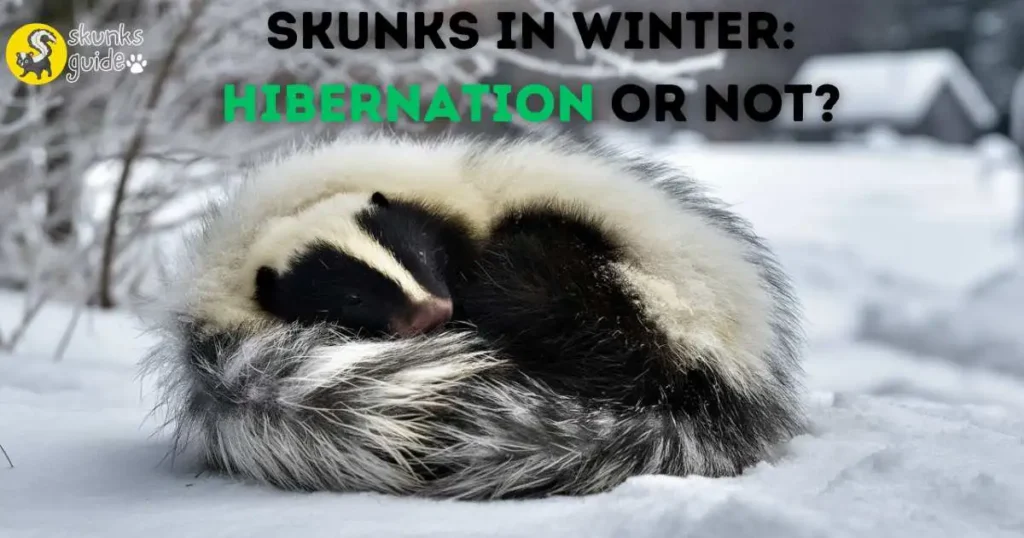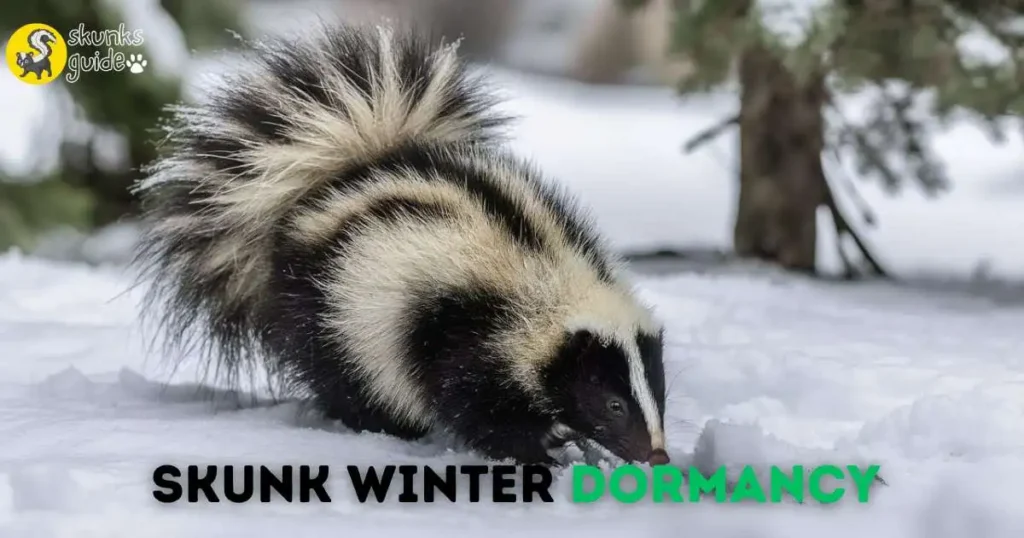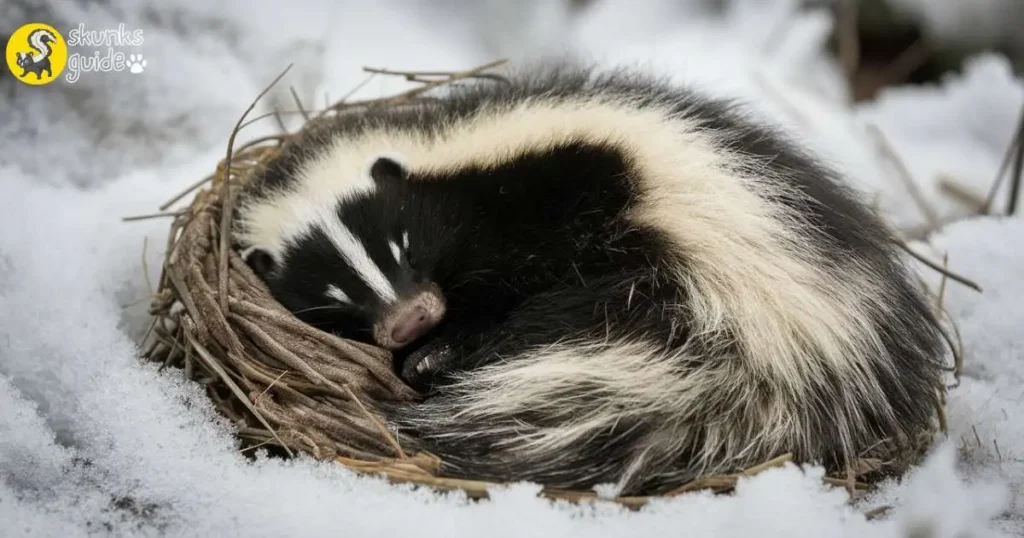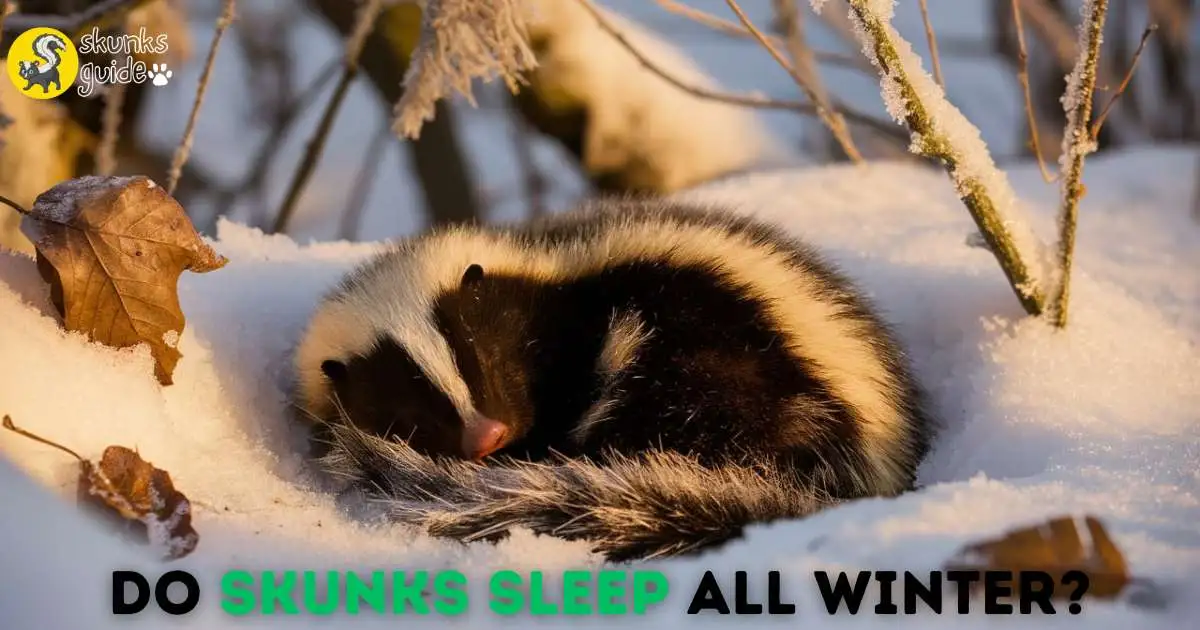Do Skunks Sleep All Winter? Hibernation Facts
Skunks do not sleep all winter. They enter a state of torpor, reducing their activity but may wake periodically.
Skunks are fascinating creatures known for their unique defense mechanism and nocturnal habits. As winter approaches, many wonder about their behavior during the colder months. Unlike true hibernators, skunks enter a state called torpor. This allows them to conserve energy while still being able to awaken if necessary.
During torpor, skunks may stay in their dens for extended periods but can become active on warmer winter days. Understanding skunk behavior in winter helps us appreciate these creatures and their adaptability to changing environments. Observing skunks can provide insight into their role in the ecosystem, making them a vital part of wildlife.
Skunks In Winter: Hibernation Or Not?
Many people wonder about skunks during the winter months. Do they hibernate? Do they sleep all season? Understanding their behavior helps us learn more about these unique animals.

What Happens To Skunks During The Cold Season
Skunks do not truly hibernate. Instead, they enter a state called torpor. This means they sleep a lot but can wake up easily.
- Skunks search for warm places to stay.
- They often dig burrows or use existing ones.
- They may share these burrows with other animals.
- Skunks rely on fat reserves built up in warmer months.
- They may wake up for food on warmer days.
Comparing Skunk Behavior To True Hibernators
True hibernators like bears enter deep sleep for months. They do not wake up easily. In contrast, skunks have different behaviors:
| Feature | Skunks | True Hibernators |
|---|---|---|
| Sleep Duration | Weeks to months | Several months |
| Waking Frequency | Often wakes up | Rarely wakes up |
| Body Temperature | Moderately drops | Significantly drops |
| Food Search | Occasional | None |
Skunks adapt to winter differently. They remain alert and can respond to changes. This behavior helps them survive in cold conditions.
Understanding Skunk Winter Dormancy
When it gets colder, skunks start getting ready for winter. They don’t truly hibernate but go into a state called “dormancy.” They become less active, spend more time in their dens, and eat less. Skunks can wake up and leave their dens to find food or move around.

Skunk Winter Denning Habits
Skunks have special ways to survive the cold winter. They look for safe spots like underground tunnels, hollow trees, or old buildings. These places keep them warm and safe from the cold. Sometimes, skunks even live with other skunks or small animals to stay warm together.
Skunk Winter Adaptations
Skunks have changed to handle the cold. They grow a thicker fur coat to keep warm. They also lower their body temperature and metabolism to use less energy. These changes help them make it through the cold months without stopping all activity.
| Skunk Winter Denning Habits | Skunk Winter Adaptations |
|---|---|
| Grow a thicker coat of fur to insulate their bodies and conserve heat lower their body temperature and metabolism to reduce energy needs | Grow a thicker coat of fur to insulate their bodies and conserve heatLower their body temperature and metabolism to reduce energy needs |
“Understanding skunk winter denning habits and adaptations is crucial to comprehending their winter survival strategies.”
Learning about skunk dormancy and adaptations helps us see how they survive winter. It’s fascinating to understand their unique ways of coping with the cold.
Do Skunks Sleep All Winter?

Skunks don’t truly hibernate in the winter. They may seem less active, but they can wake up and leave their dens for food or to move. How long and deep their sleep is can change based on the severity of the winter, food availability, and where they live.
Skunks are very adaptable, showing this in their winter behavior. Unlike some animals, they don’t sleep non-stop. They wake up now and then to meet their basic needs. This skunk dormancy period helps them survive the cold months.
To understand skunk winter behavior better, let’s look at some key points:
- Skunks don’t hibernate but have less activity and metabolism in winter.
- The length and depth of their sleep change with food availability and temperature.
- They can sleep for days or weeks but can still leave their dens when needed.
- Skunks can handle the cold and keep foraging, unlike true hibernators.
Learning that skunks don’t sleep all winter helps us understand their amazing survival skills. This knowledge not only answers our questions but also lets us see how resilient these animals are.
Conclusion
The idea that skunks sleep all winter is not true. Skunks do slow down and sleep more in the cold months. But they don’t hibernate like some animals do.
This article has shown us how skunks survive the winter. They use special ways to save energy and make it through the cold. It’s interesting to learn about their habits.
Skunks don’t sleep all winter, but they have ways to stay warm and safe. By learning where do skunks sleep in the winter, we can help protect them. This shows us how amazing nature is.
Frequently Asked Questions
How Long Do Skunks Sleep In Winter?
Skunks typically sleep for 18 to 22 hours a day during winter. They enter a state of torpor to conserve energy. This behavior helps them survive the cold months when food is scarce. Skunks are not true hibernators but enter a deep sleep to endure winter challenges.
Where Do Skunks Go During The Winter?
Skunks seek shelter during winter in burrows or dens. They often use abandoned animal homes or dig their own. These cozy spaces help them stay warm and conserve energy. Skunks enter a state of torpor, reducing their activity until spring arrives.
Do Skunks Come Back To The Same Place Every Year?
Yes, skunks may return to the same den or area each year. They often seek familiar locations with abundant food and shelter. If conditions remain favorable, they are likely to make it their home again. Regular monitoring can help manage their presence effectively.

